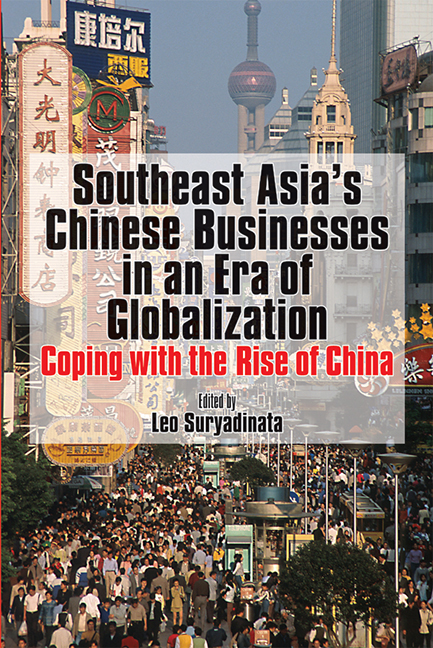Book contents
- Frontmatter
- Contents
- The Contributors
- Introduction
- China and Southeast Asia
- Indonesia
- Malaysia
- 6 China's Economic Rise and Its Impact on Malaysian Chinese Business
- 7 Competition, (Ir)relevance and Market Determinations: Government Economic Policies and Ethnic Chinese Responses in West Malaysia
- 8 Malaysian Chinese Businesses in an Era of Globalization
- The Philippines
- Singapore and Thailand
- Index
7 - Competition, (Ir)relevance and Market Determinations: Government Economic Policies and Ethnic Chinese Responses in West Malaysia
from Malaysia
Published online by Cambridge University Press: 21 October 2015
- Frontmatter
- Contents
- The Contributors
- Introduction
- China and Southeast Asia
- Indonesia
- Malaysia
- 6 China's Economic Rise and Its Impact on Malaysian Chinese Business
- 7 Competition, (Ir)relevance and Market Determinations: Government Economic Policies and Ethnic Chinese Responses in West Malaysia
- 8 Malaysian Chinese Businesses in an Era of Globalization
- The Philippines
- Singapore and Thailand
- Index
Summary
INTRODUCTION
Since Malaysia's independence in 1957, the nation's economy has been doing reasonably well with economic growth averaging 8.7 per cent annually. This trend continued until 1997, when the Asian financial crisis hit almost all the countries in the Asia-Pacific region. It is widely recognized that Malaysia's strong economic performance in the 1980s and most of the 1990s had been built on effective economic planning and a relatively efficent civil service (Ho 2002). The country had also enjoyed strong inflows of foreign direct investment in the decade before the Asian financial crisis. In retrospect after the crisis, Malaysian state policies have undergone a number of phases of adjustment — from state expansion to divestment to privatization, from the New Economic Policy to the National Development Policy to the New Vision Policy, from manufacturing to industrialization to the K-economy. These changes were by no means trivial or insignificant, and they have transformed the country's economy to what it is today.
The economic fate of the Malaysian Chinese is invariably linked to external environments (such as the forces of globalization, emergence of China, Taiwan's “Look South Policy” etc.), as well as internal factors, such as pro-Bumiputera (pro-Malay) policies and regulations, aimed at wealth redistribution in the country. With various restrictions and constraints imposed by the United Malays National Organization (UMNO)-led Barisan Nasional [National Front] government, Malaysian Chinese businesses have gone through various periods of adaptation and adjustment, submitting memoranda through business associations and political parties, building alliances with Malay bureaucrats and businesses, and lately, responding to the emergence of China as a destination for business expansion.
This chapter will examine the patterns of government economic policies and their impact on Malaysian Chinese business development over the past thirty years. While the government's pro-Bumiputera policies were restrictive toward Chinese economic development, the ethnic Chinese business community responded to these governmental discriminatory actions by making itself more competitive through organizational restructuring, political alliance and patronage, and discerning outsourcing.
- Type
- Chapter
- Information
- Southeast Asia's Chinese Businesses in an Era of GlobalizationCoping with the Rise of China, pp. 191 - 204Publisher: ISEAS–Yusof Ishak InstitutePrint publication year: 2006



